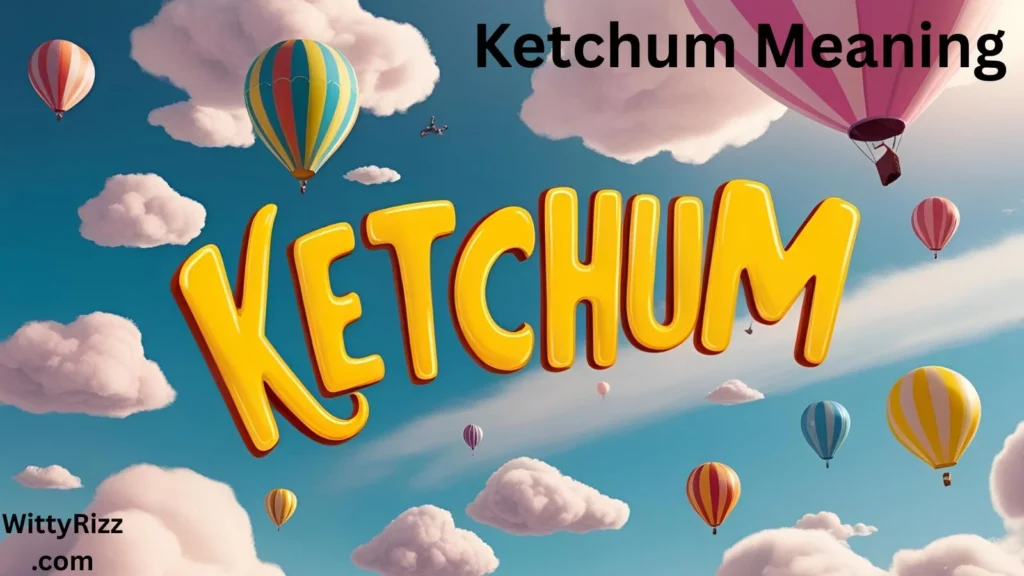In our day-to-day conversations, language evolves with us, and sometimes, we find ourselves looking for alternatives to commonly used expressions.
One such phrase is “ketchum,” which, though not frequently encountered in formal texts, has emerged in informal and online conversations.
This article dives deep into the meaning of “ketchum” and offers polite, professional, and casual alternatives to help you express well-wishes based on context and tone.
Let’s begin by exploring what “ketchum” means, how it’s used, and why it might be important to find alternative ways to convey the same sentiment. In the end, you’ll walk away with 11 fantastic examples that cater to a variety of settings and scenarios.
What Does “Ketchum” Mean?

The term “ketchum” is often used in online texts and social media. It’s typically a contraction or phonetic representation of “catch them” or “catch you,” used in informal settings or when typing casually.
It has roots in the Southern American dialect, where dropping consonants in certain words is common, especially when speaking quickly or casually.
In some cases, “ketchum” is used as a playful, phonetic variation of “catch ‘em,” primarily in informal text messages, chats, or even as slang. It’s not a standard word in the dictionary, but it’s widely understood in modern, digital communication, often used to convey a sense of catching up with someone or saying goodbye in a light-hearted manner.
In its simplest form, “ketchum” is often used as a replacement for “catch you” or “catch them,” especially when someone is trying to be playful, casual, or even quirky.
However, when we examine the phrase, we realize that there are many other ways to express similar meanings, whether you’re speaking formally, casually, or professionally.
That’s why it’s essential to explore alternatives that help you adapt your language to different scenarios.
Exploring Polite, Professional, and Casual Alternatives
Every conversation, whether it’s with a colleague, friend, or family member, requires a different tone. Some expressions are appropriate for the office, while others are better suited for a fun gathering or a quick chat with a friend. Below, we’ll break down alternatives based on the context and tone of your conversation.
1. Catch You Later
One of the most common alternatives to “ketchum” is the phrase “catch you later.” It’s used in informal conversations, often when saying goodbye to someone in a relaxed and friendly manner. This expression is versatile, as it’s neither too casual nor overly formal, making it perfect for a variety of social situations.
Example:
- “It was great chatting with you, catch you later!”
- “I’ve got to run now, catch you later!”
2. See You Soon
When you want to express that you’ll meet or talk again shortly, “see you soon” is an ideal phrase. It has a more personal tone compared to “catch you later,” and it’s often used when you’re certain you’ll reconnect soon.
Example:
- “Thanks for the help today, see you soon!”
- “See you soon at the meeting, take care!”
3. Talk to You Later
For a casual, but still friendly, alternative to “ketchum,” “talk to you later” works wonderfully. It’s appropriate for both text messages and phone conversations, and it carries a slightly more professional tone than “catch you later.”
Example:
- “Alright, I have to go now, talk to you later!”
- “Talk to you later about the project update.”
4. Take Care
“Take care” is a warm and polite way of parting ways with someone, especially when you wish them well. It can be used in both casual and more formal settings and is often paired with other phrases, such as “see you soon” or “talk soon.”
Example:
- “It was lovely seeing you, take care!”
- “Take care, and have a great rest of the day!”
5. Until Next Time
This phrase conveys a sense of looking forward to another meeting or conversation. It’s friendly but carries a slightly more formal tone, making it a good fit for both professional and personal contexts.
Example:
- “Until next time, stay safe!”
- “Until next time, let’s catch up on the project.”
6. I’ll Be In Touch
“I’ll be in touch” is perfect for professional situations where you may need to follow up or check in with someone later. It’s commonly used in emails or formal messages, signaling that the conversation isn’t over, but you’ll reconnect when necessary.
Example:
- “Thanks for your time today, I’ll be in touch.”
- “I’ll be in touch with the details by tomorrow.”
7. Goodbye for Now
“Goodbye for now” is another way of expressing that you’re leaving but expect to return or reconnect. It has a slightly more final tone than “see you later,” but it still leaves room for future interaction.
Example:
- “Goodbye for now, let’s chat soon!”
- “Goodbye for now, I’ll call you in a bit.”
8. Until We Meet Again
This phrase is a more formal or emotional way of saying goodbye. It is used to imply that you’re looking forward to meeting the person again, often used in farewell speeches or parting remarks at events.
Example:
- “Until we meet again, stay well!”
- “Until we meet again, take care of yourself!”
9. Catch Up Later
If you’re leaving a conversation with the intention of picking it up later, “catch up later” is a great alternative. It suggests that you will continue where you left off, and it’s often used in casual conversations.
Example:
- “Catch up later, we’ll talk more about this.”
- “Let’s catch up later, I have to get going now!”
10. I’ll See You Around
“I’ll see you around” is a casual and somewhat indefinite way to say goodbye. It can be used when you’re not sure when you’ll meet the person next but you anticipate bumping into them in the future.
Example:
- “I’ll see you around the office later today.”
- “Take care, I’ll see you around!”
11. Catch You on the Flip Side
This phrase is more playful and casual, often used in relaxed settings among friends or colleagues. It’s informal but adds a fun twist to your usual goodbye.
Example:
- “Catch you on the flip side, take care!”
- “I’m out, catch you on the flip side!”
How to Choose the Best Alternative
Selecting the right alternative depends on the context of your conversation and the relationship you share with the person you’re talking to. Here’s a quick breakdown of when to use each alternative:
- Casual and Friendly: Use phrases like “catch you later,” “talk to you later,” or “catch you on the flip side” with friends or close colleagues.
- Polite and Professional: “Take care,” “I’ll be in touch,” and “until next time” are suitable for more formal contexts.
- Looking Forward to Reconnecting: Phrases like “see you soon” and “until we meet again” express a hopeful sentiment of reconnection.
Each alternative has its nuance, and by choosing the best fit, you ensure that your message sounds authentic and appropriate for the situation.
Conclusion
In summary, “ketchum” may be an informal, playful way of saying goodbye or expressing the intent to meet someone later, but there are countless ways to convey the same message with varying degrees of formality and tone.
Whether you’re aiming for casual, polite, or professional expressions, the alternatives listed here give you a wide range of choices.
By selecting the right phrase, you can enhance your communication, adapt to different situations, and leave a lasting impression.

